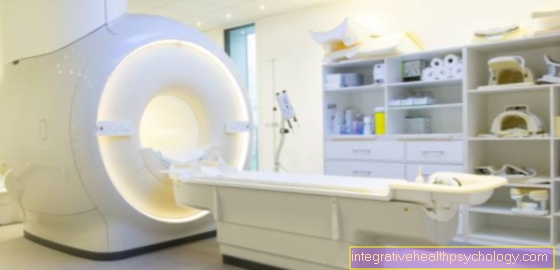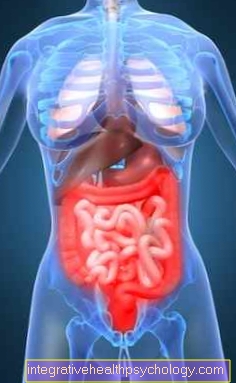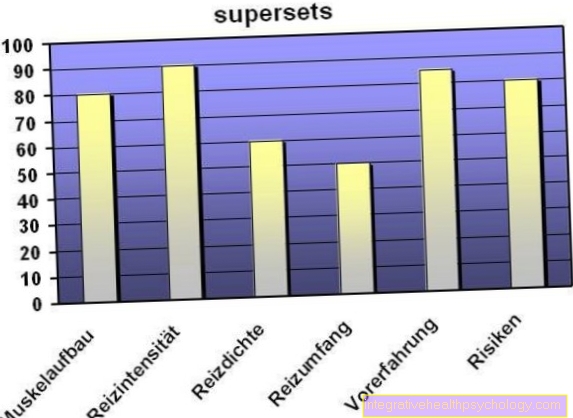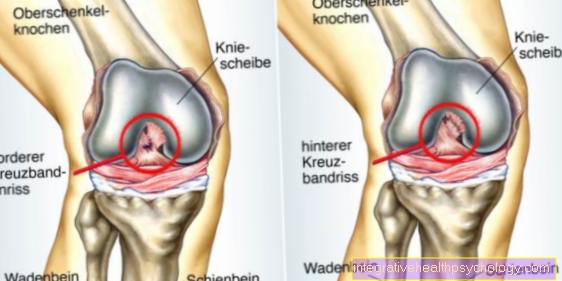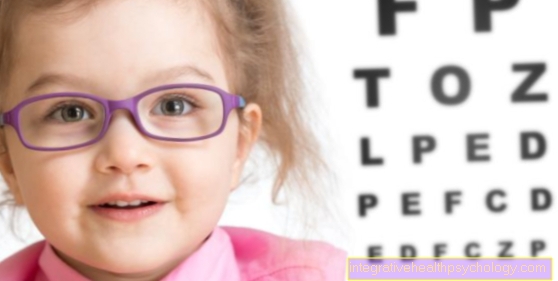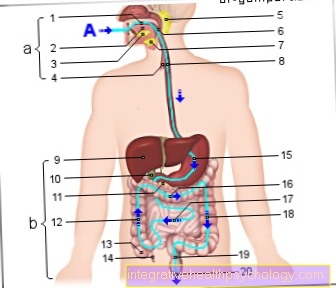Course of dementia
introduction

The dementia is a psychiatric syndromewhich can be part of a wide variety of psychiatric illnesses. It usually provides one advancing, chronic process in which various skills are gradually lost. Dementia patients are often noticed by a deteriorating short-term memory. The Thinking becomes slower - the cognitive abilities decrease - and emotional as well as social behavior, simply the understanding of it, is forgotten. Lastly, the process of the Forgetting also the areas of Brainwhich for Speech or motor skills are responsible.
Read more about that here Short term memory and its normal functions.
The course can change represent individually differently, but is mostly similar in the appearance of the individual symptoms. It is important whether it is a underlying degenerative disease act or not. The most common illness with one dementia syndrome is Alzheimer's disease. Alzheimer's disease runs chronically and continuously leads to a loss of brain capabilities. Other common diseases are, for example frontotemporal lobar degeneration (FTLD; the regression of parts of the frontal and temporal lobes of the brain) and the vascular dementia (vascular = vessel-related).
Stages
A basic division into stages is difficult if you do not know the underlying dementia. However, the further the disease progresses, the more skills are lost. Which skills are forgotten or forgotten first seem to show similarities in many cases of dementia.
Two different types of dementia are described: a continually progressing disease or dementia that worsens gradually. In dementia, which manifests itself through relapses, there are often phases in between these in which the patient is better. Their deficits are not as pronounced as before and most relatives are hoping for a cure or stagnation of the disease - but they are mostly disappointed.
You might also be interested in: Symptoms of dementia
Early stage
in the first stage, a mild dementiaabove all, the patient loses his abilities Short term memory a. While past experiences, dates or names can be called up correctly, People often forget small pieces of information that they have recently recorded and agreements. The Temporal orientation is decreasing, the patients forget the day of the week or are wrong in the date. The constant search for misplaced objects becomes noticeable and can be the first indication of the onset of dementia. The patient can, based on the status of the dementia disease run the household independentlywithout the need for additional care is increasingly found not right in strange places.
All symptoms gradually increase - At first the patients notice that something is wrong and try to compensate for their deficits. These first changes in other health of the patient namely fully experienced. This causes many feelings in those affected by Fear, frustration and dejection up to anger and aggressiveness can range.
It is a common phenomenon that dementia patients get in the early stages initially withdrawbecause they care for their shortcomings be ashamed. It is not uncommon for people who want to help the most closely related patients to be made incomprehensible. It is there important to be patient. Many people who develop dementia do not know this at the beginning and may still want an illness, for their own protection, with medical evidence don't have it.
Middle stage
Of the moderate degree of dementia is characterized by further loss of memory and first involvement of cognitive skills. Events are now forgotten or confused which could still be kept at the beginning of the illness. Also Familiar names and people are mixed up or are not available spontaneously. Even in familiar surroundings take the Orientation difficulties to. Independent paths in unknown places are hardly possible anymore. Patients can no longer concentrate wellwhat is negatively impacts numeracy and learning skills. Longer conversations that are complex in the beginning cannot be followed or Puzzles can no longer be solved.
As the disease progresses self-sufficiency goes down: the Personal hygiene is neglected and Routines of action in everyday life are no longer mastered. The state of Disorientation becomes an integral part of the patient's life. The reason for made paths is forgotten and the The patient becomes increasingly helpless. It can Speech disorders or delusions occur. Sentence structures are reproduced in a simplified manner or sentences that have been said once are repeated several times. Mood swings complicate dealing with the patient and that The behavior of relatives is often negatively influenced.
Restlessness let the patients too active at night be what a potential risk of falling conceals. At a certain point there is a nursing support of the patient, because they are no longer able to lead a completely independent life. Even with moderate dementia, it can lead to Incontinence come and everyday life can only mastered with support become.
Terminal stage
in the End-stage severe dementia it comes to one almost complete loss of memory. Spouses and children are no longer recognized. A temporal and spatial orientation is mostly no longer possible and even information relating to the patient can no longer be called up.
At this point there are vital functions such as continence, but also the Most certainly lost ability to eat or drink independently gone and turn the patient into one all day nursing case. Linguistic skills are no longer used sensibly and will eventually become in the course of the disease also forgotten.
All psychiatric side effects of the previous phases have disappeared again. The Ability to walk can, if at all, just laborious can be used. The patients are in the terminal stage bedridden and perceive neither the environment nor themselves. Of the death usually sets due to a concomitant disease of immobility (lung infection) or old age (Cardiac arrest) a.
Alzheimer's disease
in the Use of language will the Disease Alzheimer-Illness and dementia are often on the same level posed or even used synonymously. That is a Misbelief, because Alzheimer's disease is just that most common underlying disease, the a dementia syndrome in its symptoms - the dementia - includes. Alzheimer's disease is one primary dementia, which means that the clinical picture is through disease-related changes in the brain arises.
All primary dementias are the current state of medicine not reversible, so cannot be regressed. In contrast to this is the group of secondary dementia, in which timely treatment an improvement can cause.
Frequency distribution
Dementia is one Appearance of old age and is increasingly becoming one Common disease. Every 10th German who is the age of Exceeded 65 years has, already knows cognitive deficits which in some cases extend to a dementia syndrome. In old age between 65 and 70 years is the disease rate 2 %. In the period between 70 and 79 years the sentence ascends 6 % at, where Women a little more often are affected as men. This gender difference hardens again from the age of 85 and a Total disease rate of 20% comes about. To what extent the high rate of female patients is related to the higher average age of women is questionable.
Life expectancy
The Life expectancy is related to the time of illness. At a Alzheimer-Dementia like her in 60% of dementia, it happens death within 10 to 12 years of the patient. Alzheimer's is not responsible, but the condition accompanying diseases.
For example rises at Bedridden the risk of one pneumonia (lung infection) to get sick. At this you can especially old people die quickly. An example: If a person falls ill with Alzheimer's disease at the age of 67, they have a probable life expectancy of 77 to 79 years. The older the patient is at the time of their illness, the more likely it is to have secondary illnesses that ultimately lead to the death of the patient.
Duration
The Duration of dementia always depends on the Type of underlying disease from.Patients usually die from a concomitant illness, which comes about through the increasing lack of independence and immobilization, but also the old age of most patients. Common diseases are here Inflammation of the lungs (Pneumonia) or the lower urinary tract and at old age Cardiovascular diseases or. age-related cardiac arrest. The dementia disease rarely leads to death. Consequently the duration varies depending on the underlying disease and aggressiveness of the course partially between 3 and 20 years. An exact prognosis is hardly possible even with knowledge of the underlying disease.
therapy
The Therapy options are in the presence of a primary dementia with the cause of pathological changes in the brain rather limited. So far there is no prospect of a cure, but it can symptomatic a drug setting done to the burden for the patients and their relatives to be kept as low as possible.
With this in mind you can Antidementia drugs (Drugs for dementia) may be used as long as the underlying disease is indicated. Will the Dementia from depression accompanies or occurs in the course other psychiatric symptoms how paranoia or Delusions on, can also here by means of drug treatment (Antidepressants and Antipsychotics) Relief be provided.
States in which the patient is unusually restless behaves or but sleep disorders are also symptoms that weakened by various drugs if necessary can be. Is dementia not too far advanced, can be a cognitive training be considered. The patient can continue to practice his skills and thus possibly maintain them longer.
forecast
There are dementias, which reversible could be. Of the Course is determined by the disease processwhich is the basis. Is there a Treatment option available and will come with this started quickly, so the resulting dementia symptoms completely regress.
There are only about 10% of all diseases with dementia syndrome timely and appropriate treatment reversible. This includes causes of illness like the Drug abuse, Alcohol or drugs, Brain tumors or bleeding, depressions with pseudodementia and hormonally-caused brain diseases.





